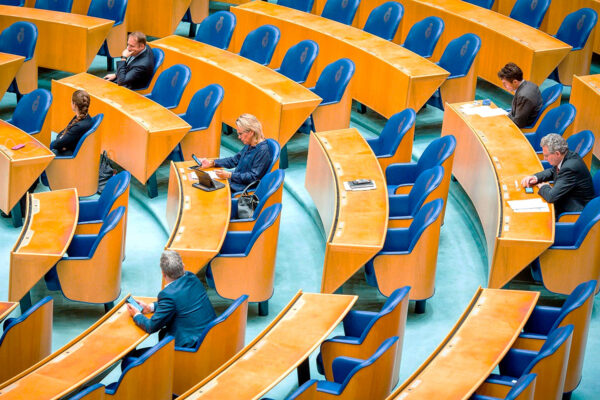
Regular readers know I’m not a fan of two-party democracy. It reduces politics to simplistic either-or choices. It encourages parties to radicalize their supporters and appeal to the extremes rather than the center. Multiparty democracy, by contrast, engenders moderation and compromise.
Multiparty democracies are superior on almost every metric: their voters show higher trust in government and each other; their electoral systems are more responsive to changes in public opinion; their economies are more competitive and their societies less divisive.
But there is a tradeoff. When voters aren’t loyal — which is itself a good thing; they should judge parties on their performance — turnover in parliament can be high, which robs it of experience and expertise.
New faces
In the Netherlands, 59 of the 150 lawmakers who will be sworn in on Wednesday are newcomers to national politics.
After the last election in 2017, the figure was 58.
Some of the newcomers bring experience from municipal or provincial politics. About one in three worked in the private sector, which is an improvement.
But so many new faces, including in the four parties that won seats for the first time, make it hard for parliament to do its job.
Falling short
Herman Tjeenk Willink, a former president of the Senate and former advisor to Queen Beatrix, warned in the Sunday morning talk show Buitenhof last week that parliamentary control of government policy is falling short.
Arie de Jong, a former parliamentarian for the Labor Party, argues much the same in de Volkskrant.
The most egregious example in recent years was the child benefits scandal that caused Prime Minister Mark Rutte’s four-party government to resign in January. (Disclosure: I’m a member of Rutte’s liberal party.)
Tax authorities had wrongly accused some 26,000 parents of fraud. Many were forced to pay back tens of thousands of euros in child support for often simple administrative errors, like incorrectly filling out a form or failing to report changes in their income. It took parliament years to unearth the details, and only with persist effort from two experienced lawmakers, one Christian Democrat and one Socialist.
Even they couldn’t devote their full time to the issue, and they will have even less time in the next parliament. Both the Christian Democrats and the Socialists lost seats.
The major parties used to have dozens of parliamentarians, allowing each to specialize in one or two topics. Now only four out of seventeen parties have more than ten deputies. Lawmakers need to combine diverse portfolios. Renske Leijten, the Socialist Party lawmaker who brought the child benefits scandal to light, sits on nine parliamentary committees, including those for climate, defense and health care.
Joop van den Berg, a political scientist, points out that the bigger parties, which can split up the work, tend to be in the ruling coalition, further inhibiting parliament’s ability to control the government. If your own party is in power, you don’t want to be too critical.
Priorities
Investico found that the number of legislative debates in the lower chamber fell from 141 in 2011 to just 65 in 2019. In that period, nearly four in ten bills were enacted without debate altogether. When there is legislative debate, small parties are often absent.
So-called thirty-member debates, which can be requested by a minority of thirty out of 150 lawmakers, have become more frequent. They seldom lead to (immediate) policy changes, and they are sometimes used for grandstanding — but there is something to be said for making a point.
The animal rights party had five lawmakers in the outgoing parliament. They might have occasionally skipped debates about higher education or municipal taxation, but they made their mark on debates about environmental, farm and food policy. It’s hard to qualify, but they probably helped shift the Overton window. The outgoing parliament enacted the most ambitious climate legislation to date. There is serious discussion about a meat tax. Voters gave the animal rights party an extra seat in the election two weeks ago.
On the far right, the Freedom Party and Forum for Democracy are virtually isolated. No other party wants to leave the EU or reduce net migration to zero. But their presence is a constant reminder to other parties that nearly one in five voters feel European integration has gone too far and immigration is too high. Other parties are responsive to that. The mainstream right has become less Europhile. Even the center-left Labor Party and far-left Socialists support immigration controls and stricter integration requirements, including learning the Dutch language and Dutch history.
Diversity
Another advantage is that parliament is quickly becoming more diverse not just in points-of-view, but in terms of people.
Trouw reports that 26 lawmakers are under the age of 35, six more than in the last parliament. 22 lawmakers, or 15 percent, are of non-Western descent, almost twice as many as in the outgoing parliament and close to the national figure of 14 percent. The new parliament will have the first transgender lawmaker in Dutch history and 59 women, an increase of five.
The chamber is still heavy on college graduates and light on members from rural provinces, but on other metrics it is a fair representation of Dutch society — which may help explain why turnout in elections and trust in government is so high in the Netherlands compared to other nations.
